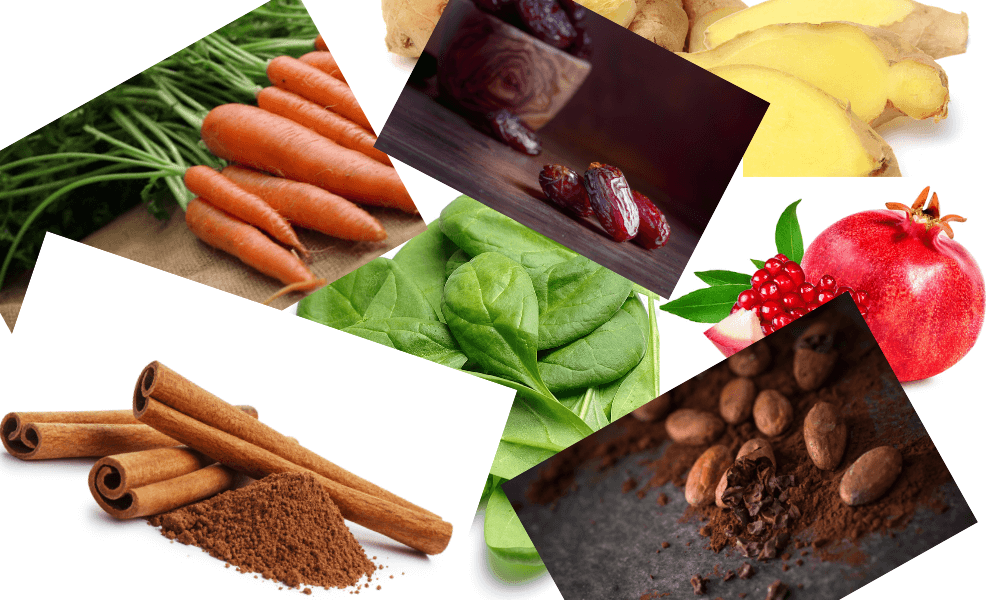With the cold winter months approaching, it is necessary to stimulate our bodies with nutrient-rich foods maintaining a balanced diet. As the winters are a prime time where cough cold and flu are an unfortunate fact of life; food is one of the best ways to combat such illnesses. Super foods help you in strengthening your immune system, increase body energy and enhance your mood as well. Super foods are nothing but a balanced mixture of a variety of foods that provide the Recommended Dietary Allowance (RDA) of nutrients:
1. Dates:

Regular intake of dates keep your body warm during winters
Regular intake of dates helps your body to stay warm during winters. It contains a lot of minerals, vitamins and health benefitting phytonutrients and most importantly they are easily digestible. The lower fat content present in dates helps you keep your weight in check. Dietary fiber (6% of daily nutritional value (DNV)) – Dates help move waste smoothly through your colon and help prevent LDL (bad) cholesterol absorption by binding with substances containing cancer-causing chemicals. Iron (1% DNV) – a component of hemoglobin in red blood cells, determines the balance of oxygen in the blood. Potassium (5% DNV) – an electrolyte, helps control your heart rate and blood pressure. B-vitamins contained in dates, such as the carotenes lutein and zeaxanthin, absorb into the retina to maintain optimal light-filtering functions and protect against macular degeneration. Vitamin A (1% DNV) – protects the eyes, maintains healthy skin and mucous membranes, and even protects the lungs and mouth from developing cancer. Tannins, which are flavonoids as well as polyphenolic antioxidants, fight infection and inflammation and help, prevent excessive bleeding (anti-hemorrhagic). Vitamin K is a blood coagulant that also helps metabolize your bones. Copper, magnesium, manganese, vitamin B6 (pyridoxine), niacin, pantothenic acid, and riboflavin are also present in dates and provide their own unique preventive and healing functions. Together, these cofactors help your body metabolize carbohydrates, protein, and fats. Eating dates in moderation can contribute to many health benefits, such as protecting against damage to cells from free radicals, help to prevent a stroke, coronary heart disease and the development of colon, prostate, breast, endometrial, lung, and pancreatic cancers.
Also Read: Food for thought
2. Cacao
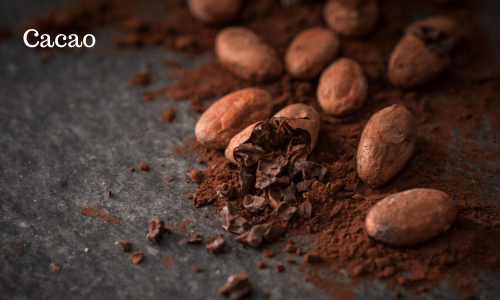
Cacao best natural sources of antioxidants, iron, magnesium and zinc
Cacao is one of the best natural sources of antioxidants, iron, magnesium and zinc. Zinc is an important trace mineral important for better immune function. Anandamide which can naturally boost your mood & create a sense of elation; it can also boost serotonin levels in the brain which is another feel-good chemical, these chemicals can then boost brain calming hormones that can relax us if we are feeling stressed & restore feelings of well-being. Flavanols that boast anti-inflammatory health benefits as well as complex antioxidants also known as polyphenols. Flavanols & polyphenols can protect against cardiovascular disease, reduce the risk of stroke, improve blood circulation, reduce “bad” cholesterol & prevent hardening of arteries. Polyphenols antioxidants can also protect our cells from premature oxidation or destruction & help us look & feel younger for longer.
Also Read: Indian Hemp: Neglected Pharmacological Treasure Trove
3. Ginger

Ginger is a powerhouse root veggie that’s packed with medicinal qualities
Raw ginger root is used both in cooking and in herbal medicine. Ginger is a powerhouse root veggie that’s packed with medicinal qualities such as antimicrobial properties and anti-nausea benefits. Additionally, a chemical in ginger called Gingerol helps decrease inflammation and blocks nerve pathways that process pain. Consuming ginger may help limit nausea and motion sickness and may help treat arthritis by decreasing inflammation. It also contains small amounts of fiber, essential vitamins and minerals, but due to the small amount usually consumed in any given meal, it is unlikely to greatly affect your nutrient intake. Macro nutrients – one-fourth cup of ginger contains 19 calories, 0.2 grams of fat, 0.4 grams of protein and 4.3 grams of carbohydrate, including 0.5 grams of fiber. Higher consumption may cause heartburn,stomach upset and diarrhea and may interfere with certain medications, including blood thinners, diabetes medication and blood pressure medications. Vitamins – eating 1/4-cup of raw ginger would provide you with 2% of the daily value for both vitamin B-6 and vitamin C, as well as smaller amounts of niacin, riboflavin, folate, thiamine and vitamin E. Vitamin B-6 is necessary for metabolism, immune function and red blood cell function, and vitamin C is important for healing wounds and for limiting damage to your cells from free radicals. Minerals – while one-fourth cup of raw ginger only provides very small amounts of iron, calcium, phosphorus and zinc; it contains 3% of the DV for magnesium and potassium. Magnesium is used for metabolism, forming proteins and muscle and nerve function, and potassium helps lower blood pressure levels and maintain proper heart and digestive function.
Also Read: Study: Increasing Protein and Dairy Intake Reduce Burden of Diabetes
4. Spinach

Low in calories rich in minerals, vitamins, antioxidants and omega 3 fatty acids
Spinach’s nutritional value indicates that it is extremely nutrient dense. It is low in calories yet rich in minerals, vitamins, antioxidants and omega 3 fatty acids. Spinach is also loaded with flavonoids which act as antioxidants and can protect the body from free radicals which is an essential health benefit all year round, but especially during winter when we are more likely to catch cold or flu. The iron rich food can also improve energy levels as iron is an important component of haemoglobin which transports oxygen to the body cells.
Also Read: Can Millets Be the Answer to India’s Nutritional Problems?
5. Carrot
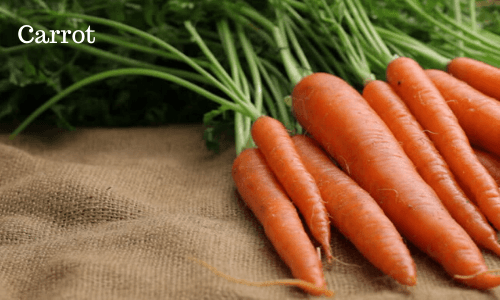
This crunchy veggie carries vitamin C, vitamin K, folate, iron, and potassium, all of which are important for fighting off germs during cold and flu season
This root vegetable contains high amounts of beta carotene which the body converts into vitamin A. Vitamin A is a key nutrient in the immune function, helping to protect against infection and reduce the risk and duration of respiratory illness by keeping our lungs healthy. It is an excellent food to protect the skin from ageing. Carrots also contain loads of vitamin A for healthy eyes, on top of fiber for good digestion. Plus, this crunchy veggie carries vitamin C, vitamin K, folate, iron, and potassium, all of which are important for fighting off germs during cold and flu season.
Also Read: Healthy Lives: Everyone, Everywhere
6. Pomegranate
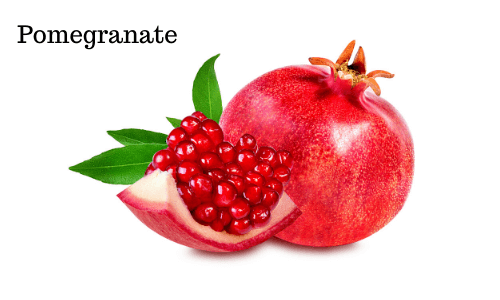
Pomegranate may have heart health benefits by improving your cholesterol profile and protecting LDL (bad) cholesterol from oxidation
Pomegranates are rich in vitamin C and contain folate, vitamin K and potassium. There is some research to suggest that pomegranate may have to heart health benefits by improving your cholesterol profile and protecting LDL (bad) cholesterol from oxidation.
Also Read: Importance of Nutrition for Improving Academic Score
7. Cinnamon
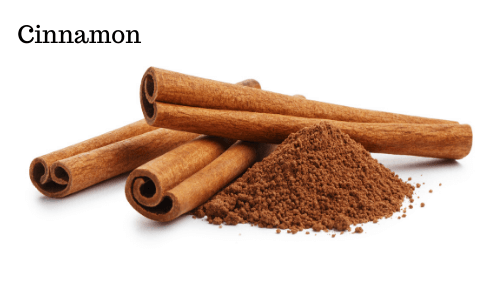
Ground cinnamon is a good source of calcium and iron
Ground cinnamon is a good source of calcium and iron, which are required for good immunity and maintaining healthy red blood cell production. Research suggests this spice may also help to lower blood sugar levels.
About the author
Nidhi Dhawan is a dietitian with experience of 21 years in the field. Ms. Dhawan practices at Diet Zone, Delhi. With BSc in Home Science from Lady Irwin college, DDPHN from IHE, Delhi and Diploma in Preventive & Promotive Healthcare from Apollo Hospitals, she is a lifetime member of Indian Dietetic Association. Her expertise is therapeutic diets like chronic kidney disease, coronary artery disease, chronic obstructive pulmonary disease, polycystic ovary disorder, diabetes type 1 and 2, chronic liver disease, jaundice, weight management, kids and infants nutrition etc.

